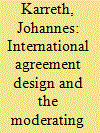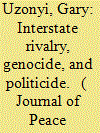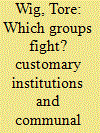|
|
|
Sort Order |
|
|
|
Items / Page
|
|
|
|
|
|
|
| Srl | Item |
| 1 |
ID:
160536


|
|
|
|
|
| Summary/Abstract |
I advance and test a theoretical argument of how participation in UN peacekeeping affects the likelihood of coup attempts in troop-contributing countries (TCCs). The argument highlights the interplay between the economic incentives of militaries in poor TCCs and the UN’s preference for contributors with stable civil–military relations. Fearing the loss of UN reimbursement funds, militaries for which such funds are important will avoid visible acts of military insubordination, such as coup attempts, that would place their future participation in UN peacekeeping at risk. I test this proposition against time-series cross-sectional data on 157 countries in the 1991–2013 period using panel regression and matching. The data show that countries where the armed forces are more dependent on peacekeeping revenues experience fewer coup attempts than comparable peers, even when taking coup-proofing measures and other alternative explanations into account. I also find that the coup-restraining effect is only observed in periods where member states contribute enough troops to award the UN a real choice over alternative contributors. The study introduces a novel theoretic logic, presents empirical results at odds with the existing literature, and suggests important policy implications with regard to UN vetting and standards for troop-contributing countries.
|
|
|
|
|
|
|
|
|
|
|
|
|
|
|
|
| 2 |
ID:
160531


|
|
|
|
|
| Summary/Abstract |
Do governments’ military build-ups foster the outbreak of intrastate violence? This article investigates the impact of governments’ arms imports on the onset of intrastate conflicts. There is scant empirical research on the role of the external acquisition of coercive technologies, and even fewer studies explore the respective causal mechanisms of their consequences. We argue that the existing literature has not adequately considered the potential simultaneity between conflict initiation and arms purchases. In contrast, our study explicitly takes into account that weapon inflows may not only causally induce conflicts but may themselves be caused by conflict anticipation. Following a review of applicable theoretical models to derive our empirical expectations, we offer two innovative approaches to surmount this serious endogeneity problem. First, we employ a simultaneous equations model that allows us to estimate the concurrent effects of both arms imports on conflict onsets and conflict onsets on imports. Second, we are the first to use an instrumental variable approach that uses the import of weapon types not suitable for intrastate conflict as instruments for weapon imports that are relevant for fighting in civil wars. Relying on arms transfer data provided by the Stockholm International Peace Research Institute for the period 1949-2013, we provide estimates for the effect of imports on civil war onset. Our empirical results clearly show that while arms imports are not a genuine cause of intrastate conflicts, they significantly increase the probability of an onset in countries where conditions are notoriously conducive to conflict. In such situations, arms are not an effective deterrent but rather spark conflict escalation.
|
|
|
|
|
|
|
|
|
|
|
|
|
|
|
|
| 3 |
ID:
160532


|
|
|
|
|
| Summary/Abstract |
Uncertainty about resolve is a well-established rationalist explanation for war. In addition to estimating the resolve of immediate rivals, leaders choose their actions in a crisis based on expectations about how third parties will respond. We argue that leaders will become more likely to develop inconsistent estimates of rivals’ relative capabilities and resolve – and thus will become more likely to fight – when domestic political changes occur in states that are allied with an opponent. We also consider how the relationship between conflict in rivalries and third-party domestic change depends on domestic political institutions in the third party. We argue that this effect should only hold when a challenger does not also share an alliance with the third party, and that the effect should be strongest when the third party is a non-democratic state. We test our theory using a dataset of changes in leaders’ domestic supporting coalitions and data on militarized interstate disputes from 1920 to 2001. Consistent with our hypotheses, we find that the likelihood of conflict increases in rivalries only when domestic coalition changes occur in states that share an alliance with only one member of a rivalry, and that this effect is strongest and most consistent for non-democratic third parties.
|
|
|
|
|
|
|
|
|
|
|
|
|
|
|
|
| 4 |
ID:
160533


|
|
|
|
|
| Summary/Abstract |
Much of international cooperation research has long assumed that building and deepening (i.e. institutionalizing) international agreements can substitute for weak domestic bureaucratic capacity when it comes to promoting cooperative policies between countries. Qualifying this assumption, we argue that domestic bureaucracies are a key piece of international cooperation: the cooperation-inducing effect of international institutions is conditional on the quality of domestic bureaucracies. We examine this relationship in the context of the politics of interstate cooperation over transboundary rivers, an important test case given concerns about looming water conflict in the face of increasing water scarcity. Using data on freshwater-related events, 1984–2006, on the level of institutionalization of river treaties, and on the quality of domestic bureaucracy, we find that domestic bureaucracies moderate the ability of international institutions to elicit cooperative interstate behavior. The finding is robust to a multitude of specifications and provides important implications for institutional research and policy approaches to cooperation problems beyond freshwater.
|
|
|
|
|
|
|
|
|
|
|
|
|
|
|
|
| 5 |
ID:
160534


|
|
|
|
|
| Summary/Abstract |
Interstate rivalry not only influences a country’s international behavior, but also its domestic conduct. Here, I focus on the connection between interstate rivalry and domestic government mass killing, specifically genocide and politicide. I argue that interstate rivalry has both direct and indirect influences on a government’s decision to use mass violence against its civilian population. Directly, countries engaged in rivalry experience a heightened state of military tension, which increases the likelihood that the country will resort to political mass killing when handling domestic dissent. Indirectly, rivalry increases the likelihood of both inter- and intrastate conflict, which also increases the likelihood of genocide and politicide. Statistical analysis of all country-years from 1955 to 2011 reveals that interstate rivals are more likely to engage in genocide and politicide than are other states. This research illustrates the way in which interstate rivalry influences a state’s domestic politics and shapes the interactions between government and population. It also highlights the importance of how the international threat environment affects a state’s willingness to engage in domestic political mass murder. These findings indicate that rivals do not only engage in the most violent interstate behavior, but also some of the deadliest domestic politics, as well.
|
|
|
|
|
|
|
|
|
|
|
|
|
|
|
|
| 6 |
ID:
160535


|
|
|
|
|
| Summary/Abstract |
What factors influence attitudes towards refugees? Do negative attitudes towards refugees also influence attitudes towards conflict in the host countries? Previous studies suggest that an influx of refugees, and locals’ reaction to them, may destabilize receiving countries and lead to conflict. In particular, actual or perceived negative effects of refugees’ presence, such as increased economic competition with the locals, disruption of ethnic balance in the host country, and arrival of people with ties to rebel groups may lead to an increased likelihood of civil conflict in countries that receive refugees. These effects can lead to instability by changing the locals’ incentives and opportunities of engaging in violence. Indeed, some studies find a positive correlation at the cross-national level between influx of refugees and conflict in receiving countries. We contribute to this literature by experimentally manipulating information about the externalities of hosting refugees. We conducted a survey-experiment in the summer of 2014 in Turkey, a country that hosts the largest number of Syrian refugees. We examine how different messages about the possible effects of hosting refugees – increased economic burden, disruption of ethnic balance, and ties with rebels, as well as a positive message of saving innocent women and children – affect locals’ perceptions of the refugees and their attitudes towards the Turkish-Kurdish peace process. We find that some messages cause locals, especially majority non-Kurds, to hold more negative views of the refugees, and in some cases to view them as a threat. Generally speaking, this information does not affect support for the peace process within Turkey. Rather, fundamental factors, such as partisanship, and previous exposure to conflict are better predictors of attitudes towards peace.
|
|
|
|
|
|
|
|
|
|
|
|
|
|
|
|
| 7 |
ID:
160530


|
|
|
|
|
| Summary/Abstract |
Why are some ethnic groups embroiled in communal conflicts while others are comparably peaceful? We explore the group-specific correlates of communal conflicts in Africa by utilizing a novel dataset combining ethnographic information on group characteristics with conflict data. Specifically, we investigate whether features of the customary political institutions of ethnic groups matter for their communal-conflict involvement. We show how institutional explanations for conflict, developed to explain state-based wars, can be successfully applied to the customary institutions of ethnic groups. We argue that customary institutions can pacify through facilitating credible nonviolent bargaining. Studying 143 ethnic groups, we provide large-N evidence for such an ‘ethnic civil peace’, showing that groups with a higher number of formalized customary institutions, like houses of chiefs, courts and legislatures, are less prone to communal conflict, both internally and with other groups. We also find some evidence, although slightly weaker, that groups with more inclusive or ‘democratic’ customary institutions are less prone to communal conflicts.
|
|
|
|
|
|
|
|
|
|
|
|
|
|
|
|
|
|
|
|
|